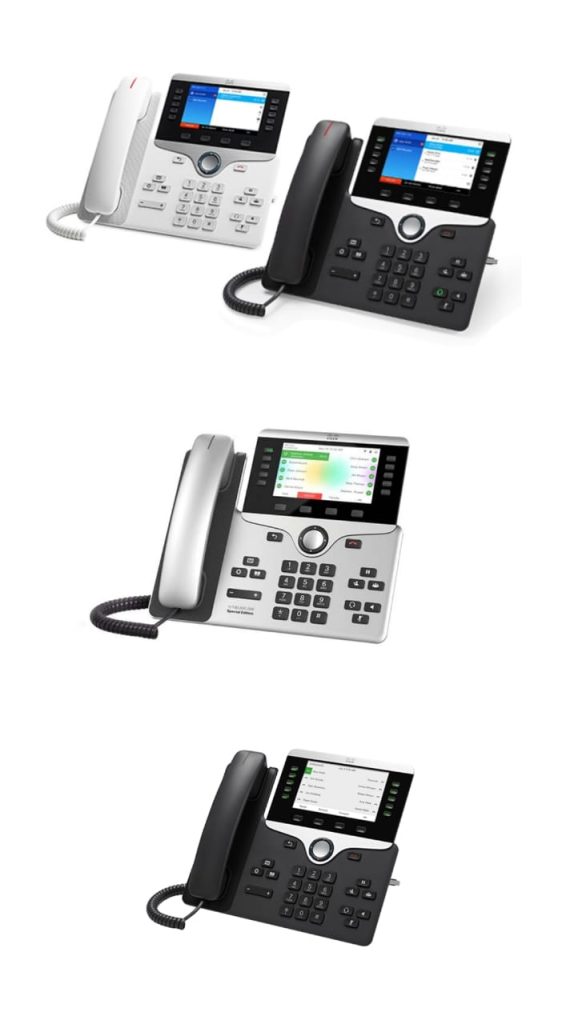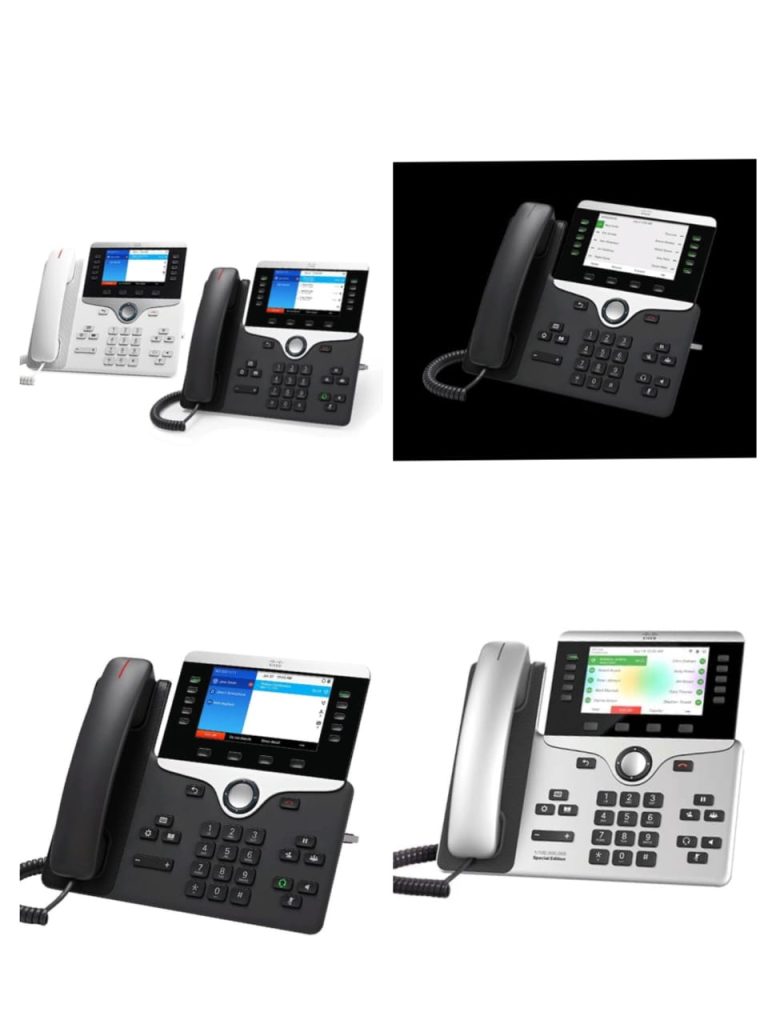Cisco IP Phones : Comprehensive Guide for Modern Businesses
Cisco IP phones are among the most trusted communication solutions in the market, widely used by businesses and enterprises around the world. Known for their reliability, advanced features, and integration capabilities, Cisco IP phones are designed to meet the needs of diverse work environments, from small businesses to large corporations. In this guide, we’ll cover the benefits, popular models, and configuration process for Cisco IP phones.
Why Choose Cisco IP Phones?
Cisco IP phones are designed with flexibility, security, and user experience in mind, making them an ideal choice for businesses looking to enhance their communication infrastructure.
- Enhanced Audio Quality: Cisco IP phones offer high-definition audio that ensures clear and smooth communication.
- Scalability: Cisco solutions are scalable, making it easy for businesses to add or upgrade phones as they grow.
- Robust Security Features: Cisco IP phones come with industry-standard encryption and security features, protecting your business calls and data.
- Intuitive Interface: Cisco’s IP phones feature user-friendly interfaces with easy access to key functions, making it simple for employees to get started.
- Integration with Cisco Collaboration Platforms: Cisco IP phones integrate seamlessly with Cisco Webex, Cisco Unified Communications Manager, and other collaboration tools, enhancing productivity.
Popular Cisco IP Phone Models
Cisco offers a variety of IP phone models tailored to meet the needs of different users, from basic office staff to executives. Here are some of the most popular Cisco IP phone series:
- Cisco 7800 Series
The Cisco 7800 Series IP phones provide high-quality voice communications with a user-friendly design, making them suitable for general office staff and common areas.
Cisco 7811: A cost-effective model with single-line support, ideal for lobbies and waiting areas.
Cisco 7821: Features a 2-line support and a monochrome display, perfect for everyday office use.
Cisco 7841: Supports up to four lines with an intuitive interface, suited for employees who handle multiple calls daily.
Cisco 7861: A 16-line model that accommodates high call volumes, ideal for receptionists and managers.
- Cisco 8800 Series
The Cisco 8800 Series offers high-end features like HD video, Bluetooth, and Wi-Fi, catering to professionals who require advanced functionality.
Cisco 8811: This basic model includes a 5-inch grayscale display, PoE, and wideband audio.
Cisco 8841: Features a 5-inch color display and supports up to five lines, great for knowledge workers.
Cisco 8851: Comes with Bluetooth and USB support, a color display, and up to 10 lines, ideal for professional users.
Cisco 8861: Adds Wi-Fi capabilities along with Bluetooth and USB ports, making it perfect for executives.
Cisco 8865: Includes a built-in camera for video calls, suitable for teams needing video collaboration.
- Cisco 3900 Series
Designed for use in common areas or break rooms, the Cisco 3900 Series provides basic IP telephony services.
Cisco 3905: A simple, cost-effective option with single-line support, typically used in areas with low call volume.
- Cisco Wireless IP Phones
Cisco’s wireless IP phones offer mobility and flexibility, making them ideal for industries like healthcare, retail, and manufacturing.
Cisco 8821 Wireless IP Phone: A rugged model designed for mobile environments. It supports Wi-Fi and has a long battery life.
Cisco 8821-EX Wireless IP Phone: Certified for hazardous environments, making it a preferred choice in industries like oil and gas.
Key Features and Benefits of Cisco IP Phones
Cisco IP phones provide a range of features and benefits that make them suitable for businesses looking to streamline communication. Here’s a look at some key advantages:
Superior Audio Quality: With wideband audio and background noise reduction, Cisco IP phones offer excellent call clarity.
Power over Ethernet (PoE): Many Cisco models support PoE, simplifying installation by eliminating the need for separate power adapters.
Flexible Call Handling: Cisco IP phones support multiple lines, call waiting, call transfer, conferencing, and other features that enhance communication efficiency.
Customizable Settings: Users can customize ringtones, display brightness, and language preferences, allowing for a personalized experience.
Integration with Unified Communications: Cisco IP phones work seamlessly with Cisco’s UC solutions, making it easy to connect, collaborate, and communicate effectively.
Setting Up and Configuring Cisco IP Phones
Cisco IP phones are relatively easy to set up, especially when used with Cisco Unified Communications Manager (CUCM). Here’s a step-by-step guide to setting up a Cisco IP phone:
- Connect the Phone to the Network: Plug the phone into an Ethernet port connected to your network. Most Cisco IP phones support PoE, so they will power up as soon as they’re connected.
- Configure the Network Settings: Once the phone is connected, it will search for a network configuration. You may need to manually configure network settings such as the IP address, DNS, and VLAN settings based on your network requirements.
- Register with Cisco Unified Communications Manager (CUCM): For enterprise use, the phone should be registered with CUCM. This will enable it to connect to the network and enable calling features. Administrators can manage configurations through CUCM’s web interface.
- Personalize Phone Settings: Users can customize their phone settings, including ringtones, speed dials, and contact lists, by accessing the phone’s menu.
- Software and Firmware Updates: Ensure that the phone has the latest firmware installed to access new features and security patches. Firmware updates can typically be pushed through CUCM or manually installed via the phone’s settings.
Frequently Asked Questions (FAQ)
Q1: Are Cisco IP phones compatible with other VoIP systems?
A1: Yes, Cisco IP phones support the SIP protocol, making them compatible with many VoIP systems. However, certain features may only be available when using Cisco’s own CUCM platform.
Q2: How do I update the firmware on my Cisco IP phone?
A2: Firmware updates can be performed through the Cisco Unified Communications Manager or manually via the phone’s menu.
Q3: Can I use a Cisco IP phone at home?
A3: Yes, Cisco IP phones can be used remotely, provided they’re configured with the correct network settings and connected to a compatible VoIP or UC platform.
Q4: What are the best Cisco IP phones for small businesses?
A4: The Cisco 7800 Series and the basic models in the 8800 Series are affordable and suitable for small businesses needing high-quality communication tools.
Q5: Do Cisco IP phones support video calls?
A5: Select models in the Cisco 8800 Series, such as the 8865, have built-in video call functionality, making them ideal for teams that require video conferencing.
Conclusion
Cisco IP phones offer versatile communication solutions designed to meet the needs of businesses across industries. With their wide range of features, models, and easy integration with Cisco’s collaboration tools, Cisco IP phones remain a reliable choice for businesses of all sizes. Whether you need a basic phone for general office use or an advanced model with video calling and wireless capabilities, Cisco’s lineup has options that can help streamline and enhance your communication strategy. For more information on Cisco IP phones, visit the official Cisco IP phone page www.cisco.com

